(完整版)新概念一册Lesson51
- 格式:ppt
- 大小:6.68 MB
- 文档页数:46

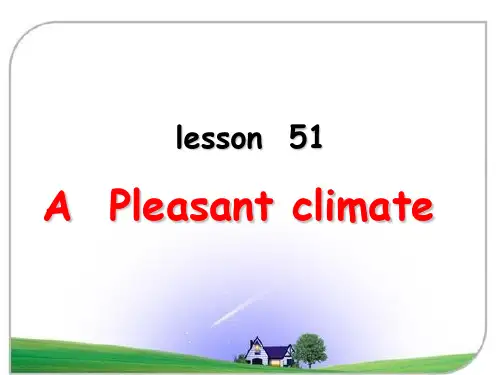
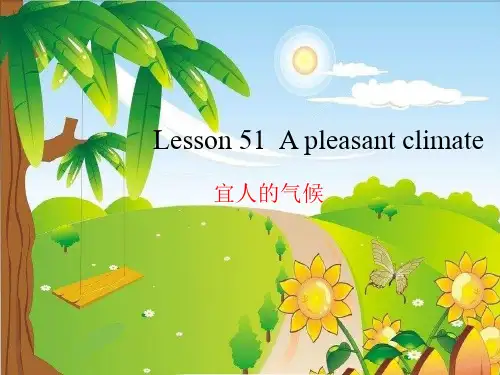

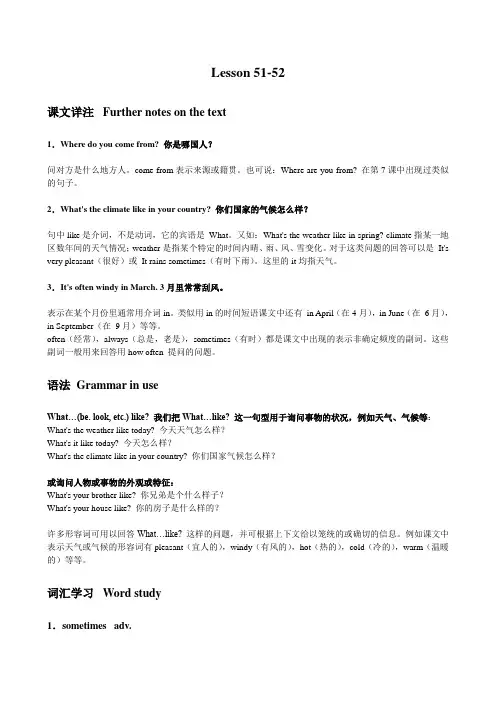
Lesson 51-52课文详注Further notes on the text1.Where do you come from? 你是哪国人?问对方是什么地方人。
come from表示来源或籍贯。
也可说:Where are you from? 在第7课中出现过类似的句子。
2.What's the climate like in your country? 你们国家的气候怎么样?句中like是介词,不是动词,它的宾语是What。
又如:What's the weather like in spring? climate指某一地区数年间的天气情况;weather是指某个特定的时间内晴、雨、风、雪变化。
对于这类问题的回答可以是It's very pleasant(很好)或It rains sometimes(有时下雨)。
这里的it均指天气。
3.It's often windy in March. 3月里常常刮风。
表示在某个月份里通常用介词in。
类似用in的时间短语课文中还有in April(在4月),in June(在6月),in September(在9月)等等。
often(经常),always(总是,老是),sometimes(有时)都是课文中出现的表示非确定频度的副词。
这些副词一般用来回答用how often 提问的问题。
语法Grammar in useWhat…(be. look, etc.) like? 我们把What…like? 这一句型用于询问事物的状况,例如天气、气候等:What's the weather like today? 今天天气怎么样?What's it like today? 今天怎么样?What's the climate like in your country? 你们国家气候怎么样?或询问人物或事物的外观或特征:What's your brother like? 你兄弟是个什么样子?What's your house like? 你的房子是什么样的?许多形容词可用以回答What…like? 这样的问题,并可根据上下文给以笼统的或确切的信息。

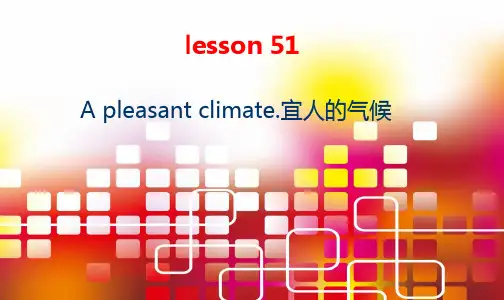
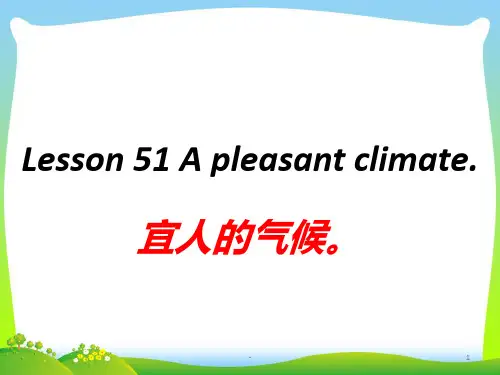

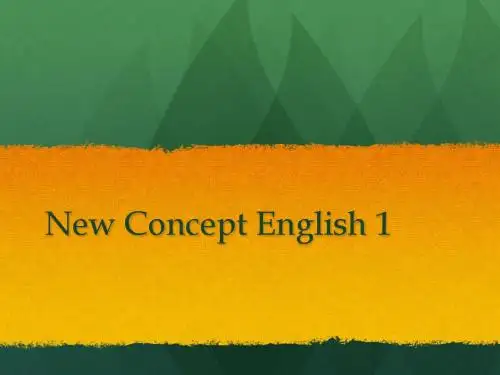
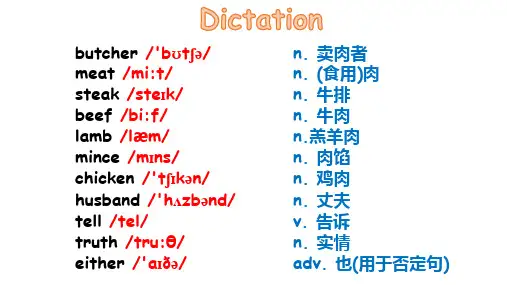
Lesson1: Excuse me!Excuse me!Yes?Is this your handbag? Pardon?Is this your handbag?Yes, it is.Thank you very much.参考译文对不起!什么事?这是您的手提包吗?对不起,请再说一遍。
这是您的手提包吗?是的,是我的。
非常感谢!Lesson 3:Sorry sir.My coat and my umbrella please. Here is my ticket.Thank you, sir.Number five.Here's your umbrella and your coat. This is not my umbrella.Sorry sir.Is this your umbrella?No, it isn't.Is this it?Yes, it is.Thank you very much.参考译文请把我的大衣和伞拿给我。
这是我(寄存东西)的牌子。
谢谢,先生。
是5号。
这是您的伞和大衣这不是我的伞。
对不起,先生。
这把伞是您的吗?不,不是!这把是吗?是,是这把非常感谢。
Lesson 5: Nice to meet you.MR. BLAKE: Good morning.STUDENTS: Good morning, Mr. Blake.MR. BLAKE: This is Miss Sophie Dupont.Sophie is a new student. She is French.MR. BLAKE: Sophie, this is Hans. He is German.HANS: Nice to meet you.MR. BLAKE: And this is Naoko. She's Japanese.NAOKO: Nice to meet you.MR. BLAKE: And this is Chang-woo. He's Korean.CHANG-WOO: Nice to meet you.MR. BLAKE: And this is Luming. He is Chinese.LUMNG: Nice to meet you.MR. BLAKE: And this is Xiaohui. She's Chinese, too.XIAOHUI: Nice to meet you.参考译文布莱克先生:早上好。
Lesson 51 A pleasant climate 宜人的气候Does it ever snow in Greece? 希腊下过雪吗?HANS : Where do you come from?汉斯:你是哪国人?DIMITRI : I come from Greece.迪米特里:我是希腊人。
HANS : What’s the climate like in your country?汉斯:你们国家的气候怎么样?DIMITRI : It’s very pleasant.迪米特里:非常宜人。
HANS : What’s the weather like in spring?汉斯:春天的天气怎么样?DIMITRI :It’s often windy in March. It’s always warm in April and May, but it rains sometimes.迪米特里:3月经常刮风。
4月5月的天气总是暖和的,但有时下雨。
HANS :What’s it like in summer?汉斯:夏天的天气怎么样?DIMITRI : It’s always hot in June, July and August. The sun shines very day.迪米特里:6月、7月和8月天气总是很热。
每天都出太阳。
HANS : Is it cold or warm in autumn?汉斯:秋天的天气是冷还是暖?DIMITRI : It’s always warm in September and October. It’s often cold in November and it rains sometimes.迪米斯特:9月和10月总是暖和的。
11月就常常冷了,有时还下雨。
HANS : Is it very cold in winter?汉斯:冬天的天气非常冷吗?DIMITRI : It’s often cold in December, January and February. It snows sometimes.迪米斯特:12月、1月和2月常常很冷。
新概念英语第一册51课课文原文全文共四篇示例,供读者参考第一篇示例:《新概念英语第一册》是一套为英语初学者设计的教材,是许多人学习英语的第一本教材。
第一册总共有149课,其中第51课是一个比较简单的课文,适合初学者练习。
本文将对第51课的课文原文进行翻译和解释,帮助读者更好地理解和掌握这篇文章。
51. An unknown goddessA young man named Constantius started a journey to seek an unknown goddess. He travelled for many days and finally came to a temple. Near the temple, he saw a beautiful girl. She spoke to him kindly and asked him why he had come to the temple. Constantius told her that he was seeking an unknown goddess. The girl then took him to the temple and showed him a statue of the goddess.从这段课文中我们可以学到一些重要的词汇和句型。
“unknown”表示未知的,不为人知的;“goddess”表示女神;“temple”表示寺庙;“statue”表示雕像;“worship”表示崇拜。
这些词汇在日常生活中也经常会用到,因此理解并掌握它们的意思是非常重要的。
除了词汇外,这段课文还包含了一些常用的句型。
“A young man named Constantius started a journey to seek an unknown goddess.”这句话的结构是主语+谓语+宾语+定语从句,可以帮助我们学习并掌握这样的句型结构。